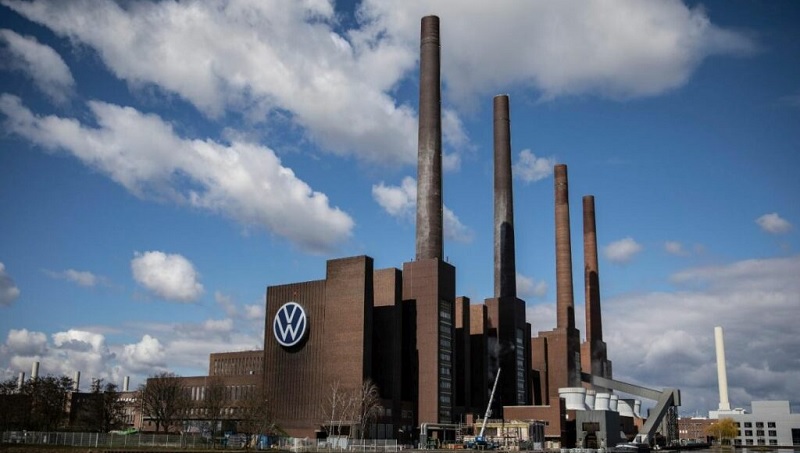
At the beginning of December, around 100,000 Volkswagen workers participated in the first warning strike of the group’s 120,000 employees in Germany. Through its spokesperson, IG Metall, the largest union in the metalworking sector in the world, promised a strike movement “such as had not been seen in the country for decades” if a “fair agreement” was not reached. However, last Friday, the union leadership finally signed an agreement with Volkswagen that provides for attacks of exceptional scale to make employees pay for the global crisis in the automobile market.
The agreement validates the elimination of 35,000 jobs in Germany between now and 2030, or almost a third of the active workforce. In their language, the two parties speak of a “socially acceptable reduction”, since it would be done through retirements, which would not be replaced by new positions, instead of the direct layoffs that had been announced until now. IG Metall also considers this to be “advance” with respect to the 55,000 positions that the company planned to eliminate.
Union negotiator Thorsten Gröger welcomed the fact that “there were no factory closures”, as Volkswagen had initially anticipated, although this is far from a certainty. On the contrary, the well-known “glass factory” or “transparent factory” in Dresden (340 employees) will stop producing cars in 2026. As for the Osnabrück factory (2,300 employees), it will stop doing so in mid-2027, and Volkswagen will now look for a buyer. Even Wolfsburg, the largest factory and birthplace of the group, will close half of its production lines, thus eliminating 4,000 jobs, while its Golf production will move to Mexico in 2027.
In addition to massive job losses, bonuses will be scrapped by 2026 and 2027, before being reduced for at least three more years. Salaries have also been frozen for the next two years. In particular, Volkswagen workers will never see the 5.5% sectoral increase that the union negotiated last month. Indeed, the management of IG Metall proposed to the company that this money be placed in a fund to finance “flexible reductions in working time for certain employees.”
Job destruction and loss of wages for workers, guaranteed dividends for shareholders
Olivier Blume, chairman of the board of directors of Volkswagen, boasted this Monday in the newspaper Frankfurter Allgemeine Zeitung of an “unprecedented agreement”. “None of his predecessors had managed to impose such a major restructuring plan on the main union, IGMetall,” congratulates the Automobile Journalthe sector’s employers’ press. However, he explains that the shareholders are disappointed because the agreement did not explicitly provide for the total closure of the factory. For this reason, CEO Blume wanted to reassure them by assuring that “the capacity reduction in several facilities is equivalent to that of two or three large factories,” before adding that “there is still a lot of work to do, especially in terms of costs.”
Volkswagen plans to save €4 billion a year in total, including €1.5 billion through lower wages and job cuts. These amounts correspond more or less to the 4.5 billion euros in dividends that shareholders will pocket in 2023, of which only 1.5 billion will go to the Porsche-Piëch family, the majority shareholder, which welcomed the agreement through its holding company. , which it describes as a “substantial contribution to a structural and sustainable reduction in costs” and a “significant improvement of Volkswagen’s competitiveness.”
Dividends in 2024 are still expected to far exceed €3 billion, and Volkswagen’s CFO recently reiterated a commitment to distribute at least 30% of net profit to shareholders. The diary The Echoes explains how shareholders were “permanently informed of the progress of the negotiations” and how “an army of Roland Berger consultants [fabricaron] Excel tables” to calculate how much they can expect to earn in the future.
The only objective of the “secrecy” of the negotiations was, therefore, to hide from the workers the scope of the attacks, to avoid any questioning from the union base before the signing. “We know that if something leaks, it will provoke reactions and can derail everything,” a union delegate explained to The Echoeswhich also tells how the publication of information about the transfer of the new ID 3 electric model from Zwickau to Wolfsburg (to replace the Golf transferred to Mexico) by the financial group Bloomberg has “sowed incomprehension and anger [entre los trabajadores] in the factory.”
The avoided strike: a betrayal of the IG Metall management
After 70 hours of negotiations in a business hotel on the outskirts of Hannover, fatigue served as a pretext for a quick signing. In separate news conferences, both sides claimed victory. IG Metall managers called the agreement a “Christmas miracle” and, according to The Echoesthey ignored the 35,000 positions that will be eliminated, which were only made official an hour later by Volkswagen management.
It is truly “a Christmas miracle” for the management of the automotive company, which was beginning to fear a large-scale mobilization. According to Reutersthe world’s largest private wealth management bank, UBS, estimated that each two-hour strike cost Volkswagen around €100 million in turnover and €20 million in operating profits, with between two and three thousand cars. The CEO’s boasts, as well as the relief expressed by the press after the agreement was signed, once the threat of a strike had passed, show that they understood that the force of one hundred thousand striking workers was capable of putting an end to Volkswagen’s plans. And yet, the IG Metall union bureaucracy decided to abdicate without a fight.
That the interests of the union bureaucracy converge more with those of the management of the German industrial flagship than with those of the workers should not surprise us when we know that the union leader Christiane Benner and the president of the works council Daniela Cavallo are also members of the SPD , the social democratic party of Germany of which Olaf Scholz, the chancellor who has just resigned, is a member. “It is not just a detail. If she were to leave the works council, Daniela Cavallo could consider a career within Volkswagen. Her predecessor, Bernd Osterloh, thus became director of human resources at Traton” (a subsidiary of the group), he points out. The Echoes.
The actions of IG Metall make it clear that workers in the most unionized sectors cannot leave their strikes in the hands of a bureaucracy that defends above all its own interests and those of the employers. The conduct of the strike by the strikers themselves, through the organization of general assemblies open to all workers, whether or not they are members of the union, will be the first condition for the workers themselves to vote on the terms of the strike and its consequences. demands. It is through this path that an alternative to the IG Metall union bureaucracy can emerge and build a mobilization capable of snatching a victory in favor of the workers against the attacks of the employers.
The original version of this article was published in French on the Révolution Permanente site, part of the International Network La Izquierda Diario in France.
Source: www.laizquierdadiario.com

